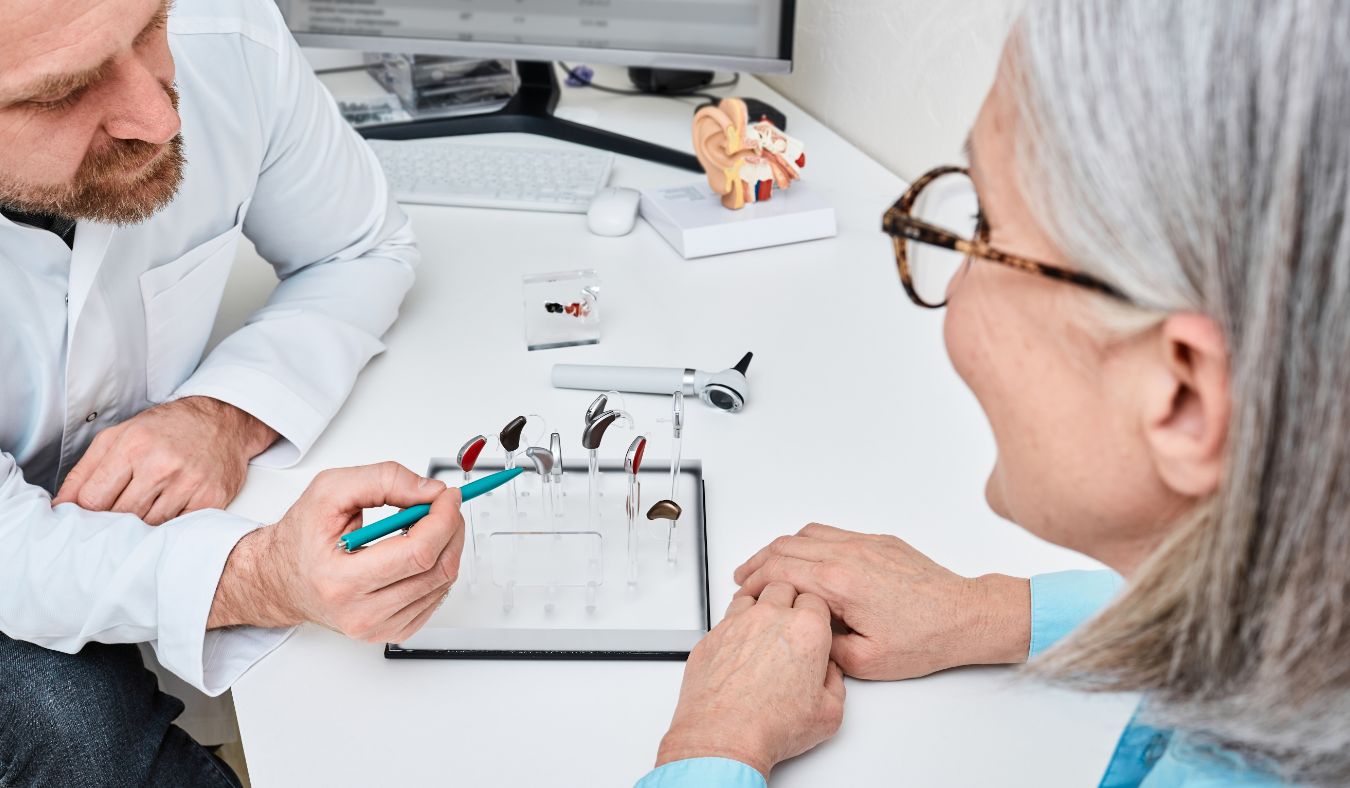Audiology Services: Hearing Care to Stay Connected
Hearing changes often happen in tiny increments. So small that you might

By: admin | July 24, 2024
Imagine if everyday noises, like chatting with loved ones or even the gentle sound of a door closing, became so overwhelming that you felt compelled to avoid them altogether. This is the reality for those dealing with hyperacusis. While most people can comfortably tolerate a wide range of sounds, from a whisper to the roar of a crowd, individuals with hyperacusis experience a heightened sensitivity to even routine sounds. For these individuals, normal sounds like the hum of a car engine or the clink of dishes can become uncomfortably loud, despite having normal hearing..
Hyperacusis can seem like a complex puzzle, but with the right information, you can understand it better. It’s a hearing sensitivity where ordinary sounds seem extraordinarily loud or harsh – as if your volume control is stuck on high.
The key to managing hyperacusis lies in understanding its nature. It’s not simply about loudness; it’s about how your brain processes sound. With hyperacusis, your brain amplifies certain sounds, making them seem louder than they really are.
Grasping this can be empowering. You might find comfort in knowing that while the sounds may feel overwhelming, they aren’t actually causing physical harm to your ears. This understanding could also guide you towards effective coping strategies and treatments offered by health professionals.
Do you ever wince at the sound of a door closing or cover your ears when the microwave beeps? If so, you might be experiencing hyperacusis. These reactions to everyday sounds could signal a heightened sensitivity to noise.
Hyperacusis can manifest differently for everyone. Some may experience discomfort at specific frequencies, while others might find a wide range of sounds overwhelming. These symptoms can often lead to avoidance behaviors, where you start avoiding situations or places that might trigger discomfort.
If you’re noticing these symptoms in your daily life, it may be time to consult with a hearing professional. They can provide guidance and suggest appropriate strategies to help manage this sensitivity effectively.
The human ear is a marvel of biological engineering, finely tuned to perceive a vast range of sounds. But for those with hyperacusis, this delicate system can sometimes go into overdrive.
Living with hyperacusis can significantly impact your daily routine. Normal sounds that most people can easily ignore, like the hum of an air conditioner or the ticking of a clock, might become a source of discomfort for you.
Hyperacusis can affect various aspects of everyday life:
Dealing with hyperacusis might seem challenging but understanding its effects on your daily activities is an important step towards managing this sensitivity effectively. It’s not about enduring discomfort; it’s about finding ways to adjust your world so you can continue enjoying the symphony of life without pain.
After acknowledging the complexities of hyperacusis, it’s time to focus on practical steps that can help manage this sensitivity. Being proactive in your approach can make a significant difference to your daily life.
Consider sound therapy, a method often suggested by audiologists. This involves listening to soft sounds for a specific period each day, gradually retraining your brain to tolerate normal levels of noise. Over time, this can help reduce the intensity of how you perceive sounds. Managing hyperacusis is not about silencing the world around you but about adjusting your reactions to it in a more comfortable way.
Audiologists play a key role in managing sound sensitivity. Their expertise is invaluable in this context, as they can provide personalized strategies and treatments to help manage hyperacusis. Over 90% of people with sound sensitivity issues who sought professional help reported a significant improvement in their sensitivity. This statistic underscores the importance of reaching out to these professionals when dealing with heightened sensitivity to noise.
Seeking help for hyperacusis starts with a consultation. This is an important step where you meet with a hearing professional to discuss your symptoms. During this meeting, the professional will ask about the sounds that cause discomfort and how they impact your daily life.
The audiologist may conduct tests to gauge your sensitivity to different sounds. These tests typically involve listening to various tones at different volumes and frequencies, which helps identify what types of sounds trigger discomfort.
After these steps, a diagnosis can be made. Here’s what you can expect:
Choosing the right treatment can be a significant step towards managing your heightened sensitivity to sound. There are several approaches to treating hyperacusis. These range from sound therapy, where you gradually expose yourself to noise in a controlled manner, to cognitive-behavioral therapy (CBT), which helps change your perception and response to sound. What works best will depend on your individual circumstances and the guidance of audiologists.
Patience is key when it comes to treating hyperacusis. Improvement may take time, but with consistent effort and professional guidance, you can certainly make strides towards reducing your sensitivity to everyday sounds.
Making adjustments to your daily routine can be a beneficial strategy in managing hyperacusis. Simple changes in your environment and habits can go a long way in reducing discomfort and enhancing your quality of life.
Creating a quiet sanctuary at home could be a room or space where you can retreat when sounds become overwhelming. Consider using sound-absorbing materials like heavy curtains, rugs or wall hangings to dampen noise levels. Noise-cancelling headphones could also provide relief during particularly loud situations.
Stress often exacerbates the symptoms of hyperacusis, so incorporating stress management strategies into your routine is important. Practices like yoga, meditation or deep breathing exercises can help calm the mind and body.
Here is a checklist for adapting your lifestyle:
Living with hyperacusis doesn’t mean you have to endure discomfort. There are a variety of tools and resources available to assist in managing sound sensitivity. These can help you adjust your environment and routines, making everyday sounds more bearable.
People with hyperacusis often experience heightened stress and anxiety because they must constantly manage their environment to avoid triggering discomfort. The constant battle to find a balance between tolerable noise levels and overwhelming sound can lead to feelings of frustration and isolation. Daily activities, like socializing or even simply living in a noisy home, become challenging and may lead to avoidance behaviors, further impacting social interactions and quality of life.
In addition, hyperacusis can contribute to mental fatigue. The brain’s constant effort to process and filter excessive sound can lead to cognitive overload, resulting in symptoms similar to those of chronic stress or burnout. The inability to escape from irritating or painful noises can exacerbate feelings of helplessness and depression.
Taking charge of your hearing health is a crucial step in managing hyperacusis. By understanding your condition and making informed decisions, you can lead a more comfortable life.
Learning about hyperacusis, its causes and how it impacts you personally allows you to make proactive changes in your lifestyle. It also enables you to communicate effectively with audiologists, ensuring that the strategies they suggest are tailored to your needs. You’re not alone in this process; there’s a wealth of resources and support available to help manage your sensitivity to sound effectively.
At Anne Arundel Audiology in Glen Burnie, MD, our team of audiologists is ready to assist you with your concerns about hyperacusis. With our expertise and personalized approach, we can provide practical hearing solutions tailored specifically for your needs. Give us a call today at (240) 917-2108 for more information on how we can help manage your heightened sensitivity to sound.
Tags: how-to guides

Hearing changes often happen in tiny increments. So small that you might
By: admin | January 23, 2026

When you notice changes in your hearing, one of the first questions that
By: admin | January 19, 2026

The hearing aids of yesteryear were clunky, uncomfortable, whistling
By: admin | January 4, 2026